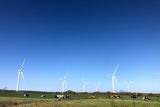For peat's sake: Where now for Bord na Móna in a green Ireland?
Amid growing calls to scrap peat-based electricity generation plants, the State-owned company faces a race against time to adapt, writes Dan White
The future of peat-fired plants served by Bord na Móna has been called into question as the Government seeks to boost Ireland’s green credentials. Photo: Nik Merkulov
With plans for new peat-fired stations having been blocked and the Government's Climate Action Plan imposing ever-tighter environmental regulations, what does the future now hold for Bord na Móna?
Although 2019 is still less than eight months old, it is already shaping up to be the blackest year in the State-owned company's 85-year history.
On July 6, the ESB revealed that it was "temporarily" closing the peat-powered Lanesboro generation plant. The closure followed a dispute with the EPA over discharges of hot water from the plant into nearby Lough Ree.
This was followed by An Bord Pleanála's refusal of planning permission for the redevelopment of the ESB's peat-powered generating plant at Shannonbridge, Co Offaly on July 23.
Coincidentally, the An Bord Pleanála decision came on the same day that Bord na Móna published its 2019 annual report.
This revealed that the State-owned peat company had lost almost €55m before tax in the year to March 27. The biggest contributors to the loss were redundancy costs of almost €42m and asset write-downs of almost €26m. When other write-downs were added, total exceptional costs for the year were €91.4m.
When this is added to the €39.3m of exceptional costs at Bord na Móna the previous year, the company has written off a total of almost €120m in the space of just two years.
Just for good measure, the Climate Change Advisory Council published its annual review the following day. The review had harsh words on the use of peat to generate electricity.
It said: "The continued use of coal and peat for electricity generation accounts for a significant proportion of Ireland's greenhouse gas emissions.
"The council calls for a detailed implementation plan for the early removal of peat and coal from electricity generation in Ireland."
The review went on to call for the closure of the coal-fired Moneypoint power plant by 2025, and the end of peat-fired electricity generation by 2020.
Council chairman Professor John Fitzgerald has been even more outspoken about the continuing use of peat to generate electricity, telling the 2018 Environment Ireland conference: "It is crazy that we are subsidising peat-fired electricity, which is a major contribution of CO2, and a very ineffective and expensive way of producing electricity."
The Climate Change Advisory Council's strictures have not come out of a clear blue sky. In reality, the writing has been on the wall for Bord na Móna since at least 1997, when Ireland signed the Kyoto Protocol, which committed this country to reducing its greenhouse gas emissions.
The knowledge that tighter environmental regulations were on the way should have acted as a restraining factor on fresh investment in peat-fired generating capacity. Instead, three peat-fired generation plants, Edenderry, Lanesboro and Shannonbridge, were commissioned in the first decade of the century.
These new peat-fired plants were protected by a 'public service obligation', which forces the ESB to purchase a fixed amount of peat-fired electricity. Fitzgerald puts the annual cost of the PSO at €100m, the equivalent of an extra €3.50 on every electricity bill.
The fact that the continued use of peat as a fuel has been strongly supported by high profile midlands TDs has no doubt helped to protect it over recent decades.
Apparently secure behind the new peat-fired generating plants and the PSO, Bord na Móna initially did little to adapt to a world that was changing around it.
As late as 2009, a full dozen years after Kyoto, almost five-sixths of its revenue was still coming from peat and peat-fired electricity generation.
It is only in recent years that the company has belatedly woken up to the need for change. However, the 2019 annual report shows that in its last financial year, Bord na Móna still relied on peat and peat-fired electricity generation for 62pc, almost two-thirds, of its revenues.
Tom Donnellan, who had previously worked in the telecommunications sector, joined Bord na Móna as chief executive in April 2018, with a brief to accelerate the company's migration from peat. The following November, Donnellan unveiled his Brown to Green Strategy.
The new strategy targets 75pc of the energy generated by the company coming from renewable sources by 2020, up from 10pc in 2010.
It also calls for the development of up to 2GW of new renewable energy assets by 2030. Of more immediate interest, it promises to cut the annual peat harvest by more than two-thirds, from 6.5 million tonnes in 2013 to just two million tonnes by 2020, and brings forward the date by which it will cease to use peat in electricity generation by two years.
"The Bord na Móna de-carbonisation journey continues apace through its Brown to Green Strategy. It will continue to transition towards a renewable energy and resource recovery business model in the coming years," says a company spokesperson. "The company targets that 70pc of its generated electricity will be renewable by 2020."
Others are not convinced. "Bord na Móna belongs to the era of the Second World War and the 1950s," says Ian Lumley, advocacy officer of An Taisce, which was one of the objectors to the Shannonbridge project.
If it were simply an argument between closing peat-fired generation plants now or in nine years' time, some kind of compromise could no doubt be cobbled together. However, the politically sensitive peat-fired generating plants are unwilling to go quietly into the good night.
It is currently envisaged that instead of closing, they will use biomass rather than peat as a fuel after 2028. Biomass, basically the waste matter left over after the logs have been sawn from felled trees, has been posited as representing the future of these plants.
That is far less certain following An Bord Pleanála's Shannonbridge ruling. The ESB, which owns Shannonbridge, has sought planning permission to convert the plant from peat to exclusively biomass.
There are, however, a number of issues with biomass. While Ireland's forests produce large amounts of log waste, most of this is already spoken for and goes to supply the country's three MDF plants. What this means is that, at least initially, the biomass used in Shannonbridge would have to come from abroad, probably from Australia. This was one of the main reasons An Bord Pleanála decided to refuse planning permission for the project, with the refusal citing the "inadequacy of the indigenous biomass supply in the State to serve the proposed development, and the proposed high dependence on imported biomass which is contrary to European Union and national policy".
Lumley is sceptical about the environmental credentials of biomass, particularly the imported variety.
"There are flaws in the logic of international carbon accounting. Shipping and aviation are excluded. The EU went down the road of supporting biomass and bioenergy. It [biomass and bioenergy] is calculated as being carbon-neutral even if it comes from Australia or south-east Asia."
Even more worryingly for Bord na Móna, An Bord Pleanála also took a swipe at peat-fired electricity generation in its ruling, saying: "It is considered that the cessation of the use of peat as a fuel is a key component within national climate and energy policy in helping to reduce the generation of excessive greenhouse emissions from the established facility, to assist in meeting the State's domestic, EU and international climate change obligations in the energy sector."
Translated into plain English, this means that An Bord Pleanála has peat-fired electricity very firmly in its sights.
So how can Bord na Móna address the twin challenges of an end to peat-fired electricity generation and the lack of an abundant indigenous supply of biomass? Under Donnellan, it is working overtime to develop other business. The problem is it is running faster merely to stand still. Of its €380m turnover last year, €89m, or just over 23pc, came from its non-energy businesses, mainly recycling and landfill. In addition, it is weaning its energy businesses off peat, mainly by investing in wind generation. All well and good, but through its continued ownership of one peat-fired generation plant (Edenderry) and its supply contracts to the ESB-owned plants (Shannonbridge and Lanesboro), it will retain a major exposure to peat for the foreseeable future.
Lumley describes the three peat-fired generating plants as being "stranded assets".
Following last month's run of bad news and the Climate Action Plan's target of reducing greenhouse gas emissions from electricity generation by up to two-thirds by 2030, it is difficult to see how we will still be using peat to generate power in 2028.
The plan itself states: "Achieving 70pc renewable electricity by 2030 will involve phasing out coal and peat-fired electricity."
While the Climate Action Plan put no precise date on the end of peat-fired generation, the pressure will be for it to happen sooner rather than later.
Fitzgerald has calculated that the implicit €100m subsidy for peat-fired generation works out at an average of €100,000 per Bord na Móna worker, approximately twice what they are actually paid by the company. How sustainable is this either economically or environmentally?
With the installation of oil heating in new houses set to be banned from 2023 and gas heating two years later, under the terms of the Climate Action Plan, An Taisce's Lumley believes that Bord na Móna workers should be retrained to retrofit insulation and heat pumps to existing houses, to allow them to meet the new, higher energy efficiency standards.
He is calling on the Government to apply to the European Investment Bank for finance to help fund such retrofitting, as Germany and Spain have already.
Will it happen? Maybe, but not yet. With a general election looming and several marginal Government-held seats in the peat-dependent Midlands, don't expect any painful decisions this side of polling day.
Join the Irish Independent WhatsApp channel
Stay up to date with all the latest news














